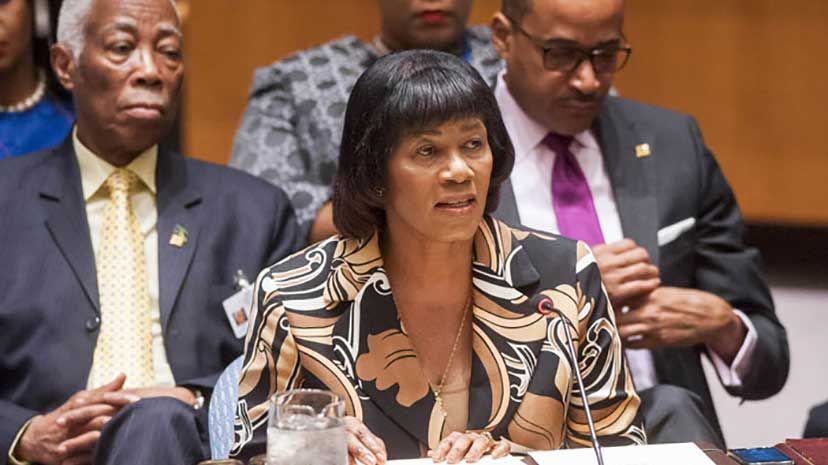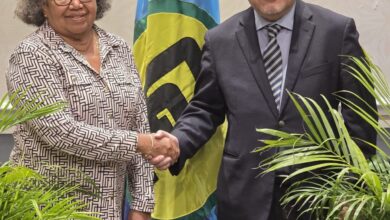NEW YORK, NY, July 31, 2015 – Prime Minister Portia Simpson Miller says Jamaica and other Caribbean countries need greater international support to fight global organised criminals and reduce crime, particularly gun-related murders.
Speaking at the powerful United Nations Security Council in New York yesterday, Prime Minister Simpson Miller said small countries like Jamaica require comprehensive debt relief and tangible development financing to increase their capacity to invest a greater share of their national budgets into effective crime fighting, border control and other domestic, regional and global peace and security initiatives.
The Prime Minister who was a panelist giving the Jamaican and Caribbean perspective at a Special Open Debate on peace and security challenges facing Small Island Developing States (SIDS) noted that in Jamaica and the wider CARICOM region, transnational organised crime represents the gravest threat to peace and security.
“Extensive, open coastlines facilitate various forms of illicit trafficking in drugs, arms, ammunition and people, particularly our women and children,” the Prime Minister said. She added that in our societies, the well-known Guns for Drugs trade remains a principal strategy of the international criminal network, while money laundering activities also enable transnational criminal activity to thrive in the region. The location of small island developing states of the Caribbean, she said, makes them a prime transit route for international narco-traffickers.
“It is well-known that we do not manufacture weapons or drive the demand for drugs, yet they find their way to our shores. It must be emphasised that these activities account for the high levels of gun-related crime that our countries are experiencing,” Prime Minister Simpson Miller pointed out. She stressed that it was cause for alarm that in 2013, seventy per cent of all homicides committed in the Caribbean sub-region featured the use of a firearm, which are not manufactured in Jamaica or other countries of the region.
The Prime Minister referenced the United Nations Development Programme’s publication, the Caribbean Human Development Report to make the point that had it not been for the significant adverse effects of gun and drug running and other results of international organised crime, the overall level of crime in the Caribbean would be similar to what obtains in low crime countries.
Recognising the effect of the current peace and security threats to undermining law and order, and impeding economic growth and social development, the Jamaican Prime Minister noted, Jamaica and other CARICOM countries have given priority attention to safety and security within their national development plans. Prime Minister Simpson Miller pointed to important gains in enhancing our security environment, with notable reductions in some categories of crime.
“I can assure you that we take these threats to our security very seriously. We have targeted our efforts at degrading the capabilities of organised criminal gangs and directed resources at addressing the shameful crime of human trafficking, including the appointment of a Trafficking in Persons Rapporteur. We have also invested heavily in technology, equipment and training for our security forces, within the constraints of our limited resources,” the Prime Minister said.
Domestic policy responses to these threats to Jamaican and Caribbean peace and security, she added, though significant and coordinated across government, are insufficient. This, the Prime Minister said, results from the features of Small Island Developing States, notably their small size, porous borders, and being prone to natural hazards and external shocks. Their import dependency, reliance on external markets, technology transfer, international capital flows and foreign expertise, as well as the constraints of high debt burdens, also serve to reduce these countries’ ability to mount effective national responses to domestic, regional and global peace and security challenges.
The limited financial base, weak technical capacity and inadequate global support continue to hamper efforts at creating the urgent need for stronger global partnerships and more efficient forms of co-operation to help SIDS in the fight against the scourge of transnational organised crime, the Prime Minister said.
Maintaining and improving the steps by Jamaica and the Caribbean for the protection of peace and security, the Prime Minister continued, was affected by the interconnected economic and social issues. In this regard, she said, limited natural and human resource bases in Caribbean small states together with persistent and significant external trade imbalances, fiscal deficits and unsustainable public debt levels, which for the Caribbean averages 70.5 per cent, have also constrained economic growth in the region. For Jamaica and other SIDS, this compounded the middle income designation which limits the ability to access critical development financing.
The Jamaican Prime Minister drew the attention of the Security Council to the proposal by the Economic Commission for Latin America and the Caribbean (ECLAC), for a debt relief strategy for countries like Jamaica and other Middle – Income SIDS.
“Comprehensive debt relief for Caribbean Small Island Developing States that would gradually write off 100 per cent of their multi-lateral debt stock is timely. In our view, this proposal is worthy of serious consideration and support from the international community.”
This, she added, is critical for building resilience in the face of climate change and to overcome the constraints imposed by small size, resource scarcity, geography and inappropriate global classification based mainly on per capita income.
The Jamaican Prime Minister told the Council that Jamaica and CARICOM countries continue to expand international cooperation to improve their national security infrastructure to deal with transnational organised crime including the drug trade and the illegal flow of small arms and ammunition. The success of many SIDS in stemming the drug trade, she added, has been nothing short of remarkable given their resource constraints. At the centre of the regional efforts is the CARICOM Implementation Agency for Crime and Security (IMPACS).
At the global level, Prime Minister Simpson Miller made it clear that within the United Nations, Jamaica has been a consistent voice in the call for multi-lateral action under the Programme of Action to Prevent, Combat and Eradicate the Illicit Trade in Small Arms and Light Weapons, to address the issue of the illicit trade in guns.
She added that in partnership with other CARICOM States, Jamaica played an instrumental role in securing the landmark Arms Trade Treaty (ATT) even as Jamaica now welcome the convening of the First Conference of States to the ATT, to be held in Mexico City next month. She said Jamaica looks forward to the full and effective implementation of the Treaty.
Prime Minister Portia Simpson Miller gave the commitment of Jamaica and CARICOM to counter-terrorism and the non-proliferation of weapons of mass destruction, and noted Jamaica’s contribution in the area of peacekeeping. For over two decades, Jamaica has been making modest but impactful contributions to UN peacekeeping activities through the provision of police officers to missions in Namibia, Liberia, Sierra Leone, Timor-Leste, and Bosnia. She disclosed that currently, Jamaica has approximately 20 of its police officers serving in the United Nations Mission in Haiti and the African Union/UN operation in Darfur, Sudan.






